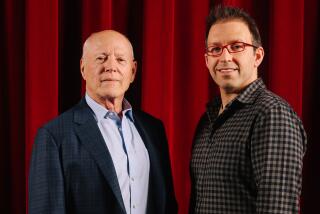COMMITMENTS : The Magic of Childhood Grows Hard in Adults
- Share via
I watched my brother die of an unknown disease I call halfheartedness. Through a gradual closing of the heart, many of us seem to join the parade of the living dead.
Since his death, I have come to understand how magic in a child is wounded early by adult cynicism. The poison produced by half-lived lives shows in our frowns, frustrations and fears. It acts like a toxin to close the door of a child’s heart.
My brother’s aging face reflected the closing of his heart. Once full of childhood wonder and surprise, it aged to a clown’s mask covering dark cynicism. It looked like an engraved sneer. That mask became the way he dealt with the world, because he could no longer be deeply moved by experiences of the heart.
We accept halfhearted life as a normal way to live. It has become so ingrained in our individual and collective psyche that we create institutions, professions, literature and religions to support the sleep of the weak-hearted.
Do you feel your life makes a difference in your family and community?
Rosa Parks’ actions show her wholeheartedness. When told to move to the back of the bus, this dignified African American said, “No!” and challenged segregation in America.
Mahatma Gandhi’s life was wholehearted. Nonviolently, he refused to pay an unfair salt tax levied by the British government. By that act he started a process that allowed India to become a free nation.
Parks and Gandhi believed their lives could make a difference--and they did.
*
I sat beside my brother, who was slowly suffocating to death following a stroke that had damaged the part of his brain that regulates breathing and swallowing.
For four days I watched him struggle for every breath, which most of us assume is a natural and ongoing event. Each in-breath was a descent into the hell of physical pain; each out-breath was a three-second relief before the descent into hell was to begin again.
As I watched that struggle, I thought about what happens when a process we take for granted becomes a battleground for a life-or-death drama. My brother battled each breath as if he were in hand-to-hand combat. It took the threat of the loss of his last breath to so center his attention that I felt his presence for the first time in our 60-year relationship.
Once, he awoke, looked into my eyes and then lapsed back into the coma. For that moment, his armored mask changed into a look of openness I had seen only in a childhood photograph of him. In some way, Mario’s dying was the most alive I had ever experienced him.
I thought to myself that it seems to take the power of the smell of death to descend to the underground river of our deepest nature, where change is possible, and our distorted mode of presence is challenged.
My brother spent his entire life avoiding conflicts and issues that could have prepared him for the final crossing. As I watched him gasp for each breath, I pondered whether Mario realized how much of his creative energy he had used to avoid life. All the energy he used perpetually waiting and constantly hiding was summoned for one final breath. That final breath was his attempt to blow down the door of death.
He had lost the connection with the magic kingdom of his original spirit.
He died the way many of us are dying: pushing love away, filling our lives with avoidance addictions and hiding within a fortress made up of the mortar of isolation, fear, cynicism.
I say goodby to Mario and all who lived in quiet despair, never seen, loved, nor understood at a deep level. They lived and died in perpetual waiting and perpetual loneliness.
I placed a flower and a note on my brother’s grave that said: “I’m sorry for you and all the others who die without ever being deeply known. I want to let you know that you did not die in vain, if some of us are motivated to search for our magic kingdom.”
More to Read
Sign up for Essential California
The most important California stories and recommendations in your inbox every morning.
You may occasionally receive promotional content from the Los Angeles Times.













